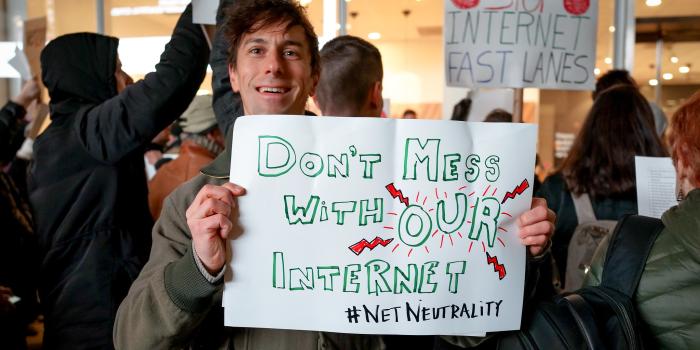Revolving-Door Alert: Tribune Hires FCC Chairman's Right-Hand Man

This piece originally appeared on the Huffington Post.
A lot of things don't work at the Federal Communications Commission.
Consumer complaints disappear for years into seemingly bottomless file drawers. The wonky proceedings are hard to decipher if you're not a telecom lawyer. Even the website is clunky.
But at least one thing at the FCC always runs at full speed: the revolving door.
Senior FCC staffer cashes in
The latest FCC official to get a job in the industry he used to regulate is Edward Lazarus, Chairman Julius Genachowski's former chief of staff. The Los Angeles Times reported on Tuesday that Lazarus is the new general counsel of Tribune Co.
Now it just so happens that Tribune Co. — which emerged from bankruptcy at the end of 2012 — is at the center of a major dispute at the FCC over whether the agency will trash longstanding rules on how much media one company can own in a single market.
Tribune Co., which owns 12 daily newspapers and 23 TV stations, has long pushed the agency to remove any limits on media ownership.
The company operates both the major daily paper and broadcast outlets in Chicago and Los Angeles under waivers from the FCC, but those waivers won't automatically carry over if the properties are sold.
Numerous reports also indicate that Tribune would like to get out of the newspaper business altogether.
But the potential buyer with the deepest pockets — News Corp.'s Rupert Murdoch — is prohibited from buying the flagship Chicago paper or the Los Angeles Times under current FCC rules because he already owns TV stations in those markets.
This is where the Tribune Co.'s desire to boost its sales price collides with the public interest. And where the FCC comes in.
Giveaway to big media
We know media concentration raises the barriers for entry for new and diverse voices. Consolidation is bad for journalism — and bad for business, too. (Exhibit A: Tribune Co.)
The idea of giving more power to the Fox News-backing, phone-hacking Murdoch is only the most obvious and immediate threat to a healthy media landscape.
But new rules now reportedly circulating among the five FCC commissioners for a vote will result in just that kind of big media giveaway. The FCC chairman has proposed lifting the ban in the top 20 markets on one company owning both the daily newspapers and a TV or radio station.
Now, who came up with the idea to deliver this priceless gift to Murdoch? Could it have been ... Eddie Lazarus?
It was during his time as Genachowski's consigliere, after all, that the FCC decided to defend the previous administration's failed media ownership policies in court rather than scrap them altogether. The FCC lost that case.
Undeterred, and under Lazarus' guidance, the FCC continued to push against the Obama administration's stated policies — and for more consolidation.
The current proceeding was prepared when Lazarus was still at the agency and launched in December 2011, just a few days after Lazarus had announced his resignation but before he actually left the building.
Now one year later, just as his temporary ban on lobbying his old colleagues expires, Lazarus shows up near the top of Tribune Co., one of the companies that stands to benefit most from the FCC's proposed changes — changes that Lazarus worked to put back on the table while he was still at the FCC.
What a coincidence.
Lazarus' new job may help explain why Chairman Genachowski seems so determined to buck not just President Obama (who opposed these exact same rules when the Republicans pushed them) but more than 60 members of Congress, the federal courts, every major civil rights organization and 99 percent of the public.
Or maybe it's all just one big fluke, and Lazarus is just another regulator cashing in at a company he was once supposed to regulate.
And that's how official Washington is sure to treat this news — with a shrug.
Selling out is the new normal
Former FCC Commissioner Meredith Atwell Baker quit her job at the agency to become a Comcast-NBC lobbyist — right after voting to approve the mega-merger that united those companies. Former FCC Chairman Michael Powell is now the cable industry's top lobbyist.
Other top advisers to the current FCC chairman now work for the National Association of Broadcasters, Google and Microsoft. It's rumored that both Genachowski and his Republican colleague, Commissioner Robert McDowell, are actively looking for their next gigs.
All of this is business as usual at the FCC — and that's the problem.
Too many people go to work for the FCC with the expectation of cashing in on their public service. The few who don't — like former commissioners Michael Copps and Gloria Tristani — are the exceptions.
You can't just blame the companies: They hire insiders like Lazarus because it gets results — for them.
But the deep-seated industry capture at places like the FCC is the biggest obstacle to making policies that would actually benefit the public.
That's why we need to start treating the hiring of people like Lazarus as the scandal it is. Until we slow the revolving door between government and industry, the public will always be left out in the cold.





